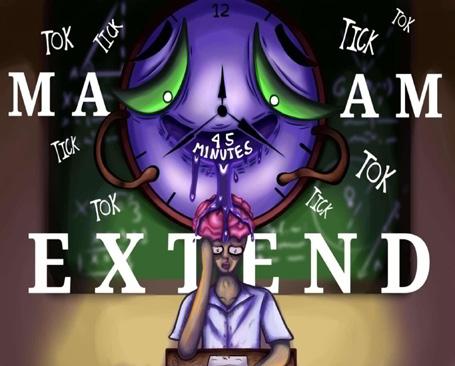


AReading teacher makes space for SEL





AReading teacher makes space for SEL

fter a survey with learners and teachers at Ponciano Bernardo High School, 51% of learners favored a 45-minute class duration; however, it was evident that the majority of teachers opposed the provision to implement the MATATAG curriculum.


The Hillside Chronicle conducted the survey from January 27 to 28 following DepEd Memorandum No. 012, s. 2024 or the Amendment to DepEd Order No. 10 s. 2024 (Policy Guidelines on the Implementation of the MATATAG Curriculum).
According to the results of the survey released on January 30 by The Hillside Chronicle , 51% of learners surveyed expressed contentment with 45-minute classes, while 34% preferred 60 minutes, 15% chose 55 minutes, and no learner declined to respond to the survey.
About 90 learners from various grade levels, making up 10% (900) of the total school population, took part in a survey held from January 27 to 28.
Learners who favor a 45-minute class duration said it was tiring to remain in a single class for an hour.
One learner said that it is hard to stay awake during these lengthy classes.
Learners feel they get easily distracted in a one-hour class.
A Grade 7 learner in favor of 45-minute classes said, “Sa henerasyong ito, mas maikli ang ating attention span. Sa mas maiikling klase, mas makakapag concentrate ka sa iyong partikular na gawain.”
(In this generation, our attention span is shorter. With shorter classes, you can concentrate better on your specific task.)
However, there were some learners who favored longer classes instead.

Which option for instructional time was introduced under DepEd Order No. 12 s. 2024 must be adopted at PBHS to ensure the effective implementation of the MATATAG Curriculum? Learners Teachers
SOURCE: The Hillside Chronicle Online Survey 2025

Learners who prefer the 60-minute class duration said that shorter classes left them feeling hurried and worried. Having additional time for a single subject made them feel capable of completing more learning tasks.
One Grade 10 learner said, “May dagdag na oras para tapusin ang mga gawain sa pag-aaral, at hindi mo na kailangang i-worry ang tungkol sa maraming klase araw-araw.”
(There is additional time to finish learning activities, and you won’t need to worry about multiple classes every day.)
In another survey, The Hillside Chronicle asked the preferences of all 30 teachers at Ponciano Bernardo High School regarding DepEd’s recommended instructional time for the rollout of the MATATAG curriculum.
Approximately 50% of teachers (15)
at Ponciano Bernardo High School reported being satisfied with a teaching duration of 60 minutes, while 17% (5) favored 45 minutes, and 33% (10) decided not to choose among the provided class duration options.
Teachers who enjoy the one-hour classes said that they valued the opportunity to address more learning content.
A Grade 7 teacher said, “Additional class time enables teachers to address more questions from learners and provide further clarification.”
Meanwhile, teachers favoring the 45-minute learning sessions stated that learners lack the opportunity to become bored as they are continually engaged in activities.
“Ang mga bata ay walang oras na magsawa dahil palagi silang gumagalaw,” said a Grade 10 teacher.
In the meantime, teachers who decided against choosing from the available instructional time options stated that both learners and teachers are adept at adapting to change, whether class length is reduced or lengthened.
One Grade 8 teacher said, “No matter if we approve or disapprove of class durations, teachers work to adjust and enhance their teaching experience.”
Ponciano Bernardo High School began implementing 45-minute classes at the start of the first academic quarter of the 2024-2025 school year.
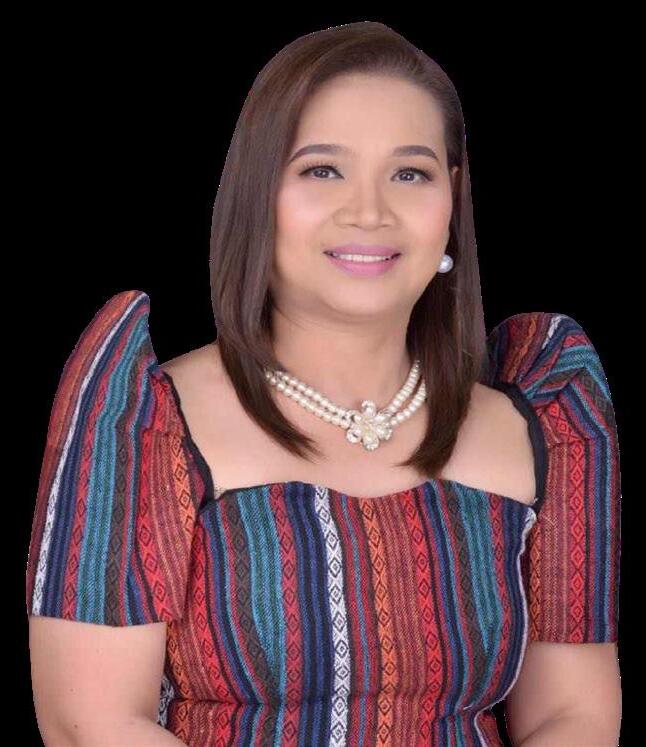
John Lorenzo Talamisan
T hrough DepEd Memorandum No. 392, s. 2010 or the “Guidelines on Giving Homework or Assignment to All Public Elementary School Pupils,” Edgardo Cruz, the newly-designated principal of Ponciano Bernardo High School, reiterated the need for adherence to “No Homework” policy.
Cruz made the reminder during the first academic quarter homeroom parent-teacher conference that was held on August 18.
He mentioned at the conference that he would discuss with the teachers to refrain from assigning homework every Friday. He further reaffirmed that the policy seeks to allow learners to spend more quality time with their parents, family, and friends by restricting homework to a manageable amount on school days and by eliminating them entirely on weekends.
Ma. Ysabella Kim
ight Grade 7 teachers from Ponciano Bernardo High School participated in division-based training from July 15-19, as part of the initial implementation of the MATATAG curriculum, which took place at various public schools in Quezon City.
According to DepEd Memorandum No. 010, s. 2024, during the week-long MATATAG training, all teachers from various learning areas were expected to grasp the learning competencies and to prepare themselves for effective classroom instruction.
Present at the division training from PBHS were Remedios Sulabo (Filipino), Cristine Gloria (English), Reymark Fulgar (Mathematics), Rhea Valencia (Science), Evelyn Carlos (Araling Panlipunan), Arianne Ticala (TLE), Cassandra Villacorte (ESP) and Jomari Baguinon (MAPEH).
The Grade 7 teachers from PBHS expressed that the MATATAG training they attended was highly beneficial for both teachers and learners. It offered them the necessary learning tools and knowledge to tackle any difficulties associated with the new curriculum, enabling a more seamless transition and effective implementation.
“Sa simula, syempre, kinakabahan ako dahil sa bagong curriculum.” Kaya, nag-aakalang hindi alam ang susunod na hakbang, ngunit habang nagpapatuloy ang pagsasanay, luminaw ang aking isip. Maraming natutunan at maraming naibabahagi sa mga mag-aaral,” said Reymark Fulgar, a Grade 7 Mathematics teacher.
(Initially, I was anxious due to the new curriculum. Thus, believing I was uncertain about the next step, as the training progressed, my thoughts became more focused. “There’s much to learn and plenty to share with the learners.)
The Department of Education had earlier stated that the next phase of teachers’ training for the MATATAG curriculum is set to take place during the school year 2025-2026 for Grades 2, 5, and 8.
Two members of The Hillside Chronicle bagged awards at the congressional district 4 secondary schools press conference held at St. Paul University in Quezon City last October 7. King Alexa Razon, Editor-inChief, secured 10th place in editorial writing.
Meanwhile, Zoilo, a news writer, secured 5th place in news writing.
Championing for a new curriculum rollout demands significant effort and may encounter various obstacles prior to its total implementation. Therefore, to explore the lived experiences during the initial implementation of the MATATAG curriculum for Grade 7 teachers at Ponciano Bernardo High School for the School Year 2024-2025, The Hillside Chronicle conducted a semistructured interview with the Grade 7 teachers who received training on the MATATAG curriculum.

Following the analysis of the transcribed responses, The Hillside Chronicle disseminated and interpreted the teachers’ responses grounded in their personal experiences with the implementation of the MATATAG curriculum.
The interview findings highlighted four key themes that arose from the Grade 7 teachers’ responses: championing resiliency, advocating the acceptance of responsibility, advocating a sense of resourcefulness, and
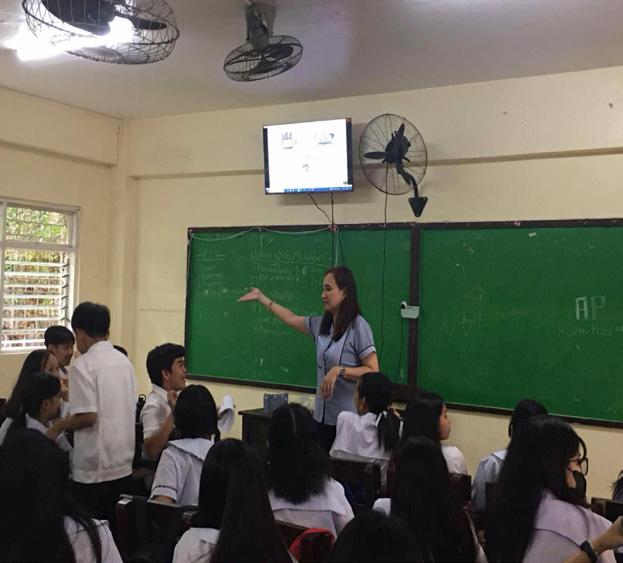
advocating adaptability. The themes identified emphasized the experiences of the Grade 7 Teachers from Ponciano during the initial phase of the MATATAG implementation.
Below are some of the selected excerpts for the interview:
“The main problem at present is the allocation of time; it is impossible to address all the most essential learning competencies in the identified timeframe” – Teacher A
“The lesson exemplars are interesting; however,

I need to modify them because certain resources are not accessible” – Teacher B
“The implementation is disheartening because some learning materials are not available, so I have to search online for alternative resources to use in my class” –Teacher C
“I must adjust my instructional methods to match my learners’ knowledge, as some suggested concepts and skills are beyond their reach” – Teacher D
Based on the transcribed themes from experiences in
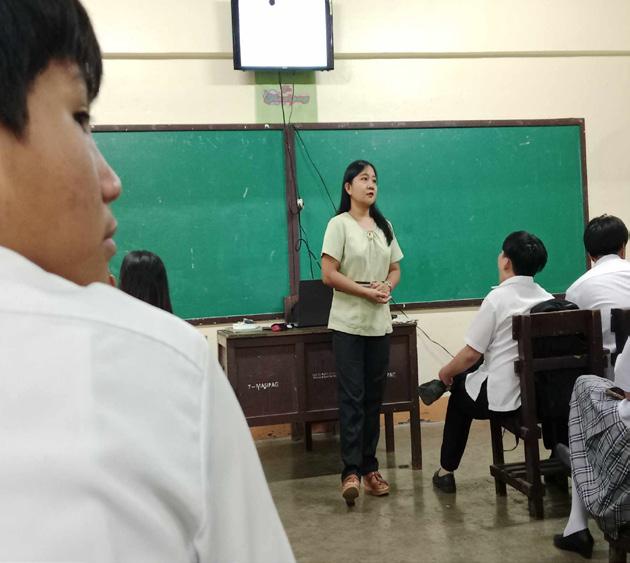
implementing the MATATAG curriculum, Grade 7 teachers recommended a teacher support implementation strategy that should comprise, but not be restricted to, planned technical assistance, professional development initiatives, and emotional support to enable them to champion the implementation of the MATATAG curriculum.
The second phase of MATATAG curriculum will take place during the school year 20252026 for Grades 2,5, and 8.

Ponciano Bernardo High School conducted a workshop designed to help teachers assess learning outcomes using the Structure of Observed Learning Outcomes (SOLO) framework during the first day of the 2024 midyear school-based In-Service Training for Teachers (INSET) held on November 25.
The SOLO workshop was facilitated by Cecilia Regala, a master teacher of Mathematics at PBHS.
Regala stated that the main objective of the workshop was to equip teachers with the Higher Order Thinking Skills Professional Learning Packages (HOTS-PLPs), aimed at transforming teaching approaches and enabling learners to explore learning areas more deeply, promoting intellectual curiosity and critical thinking.
“Ang workshop ay naglalaman ng iba’t ibang estratehiya, nakakaengganyong mga teknik, at nakakapukaw na mga gawi sa silid-aralan na maaaring gamitin ng mga guro upang mapahusay ang mga mahahalagang kasanayan ng mga estudyante, tulad ng kritikal na pag-iisip, malikhaing pag-iisip, paglutas ng problema, at mas mataas na antas ng pag-iisip,” Regala said.
(The workshop featured various strategies, engaging techniques, and stimulating classroom practices that teachers could employ to enhance essential skills in students, such as critical thinking, creative thinking, problem-solving, and higher-order thinking.)
Meanwhile, The Hillside Chronicle inquired with some teacher-participants about their key takeaways from the SOLO workshop, and they shared the following insights:
“The Structure of Observed Learning Outcome (SOLO), as I understand it, is a form of assessment intended for educators to evaluate their students objectively through the various levels of questioning that this framework facilitates. The five levels: Pre-structural, Unistructural, Multistructural, Relational, and Extended Abstract are components/tools utilized to assess each learner’s comprehension of the assigned question. It allows the teacher to assess how well the learners have mastered the competencies covered, based on the responses they gave,” shared Rojeto Sidon Jr., a Grade 8 Mathematics teacher.
Meanwhile, a Grade 9 Science teacher, Mary Joy Laniohan remarked, “When I reflect on the SOLO framework, I remember the many times I have
struggled to assess student learning. It is easy to get caught up in the idea that learners should just recall information, yet the SOLO framework has led me to think beyond that. Focusing on the structure of student learning has given me a deeper understanding of how they think and process information.”
Jomari Baguinon, a Grade 7 MAPEH teacher, further expressed, “Ang pinaka-nakikita ko ay ang ideya na ang pagkatuto ng mga estudyante ay hindi palaging tuwid.Kinilala ng SOLO framework na ang mga estudyante ay
maaaring lumipat-lipat sa pagitan ng mga antas, at ayos lang iyon.Ito ay nagsisilbing paalala na ang proseso ng pagkatuto ay magulo, at iyon ang dahilan kung bakit ito napakaganda.”
(What stands out to me the most is the notion that student learning is not always linear. The SOLO framework recognizes that students may transition between levels, and that is perfectly fine. It serves as a reminder that the process of learning is chaotic, and that is what renders it so beautiful.)
Immaville Gervacio, a Grade 10 MAPEH teacher also stated, “As I progress, I am dedicated to employing the SOLO framework to guide my teaching approach. It is not only focused on evaluating student learning; it is about fostering an environment where students feel encouraged to take risks, build connections, and develop.”
The INSET in public schools nationwide was conducted from November 25 to 29 as outlined in DepEd Memorandum No. 310, s. 2024.
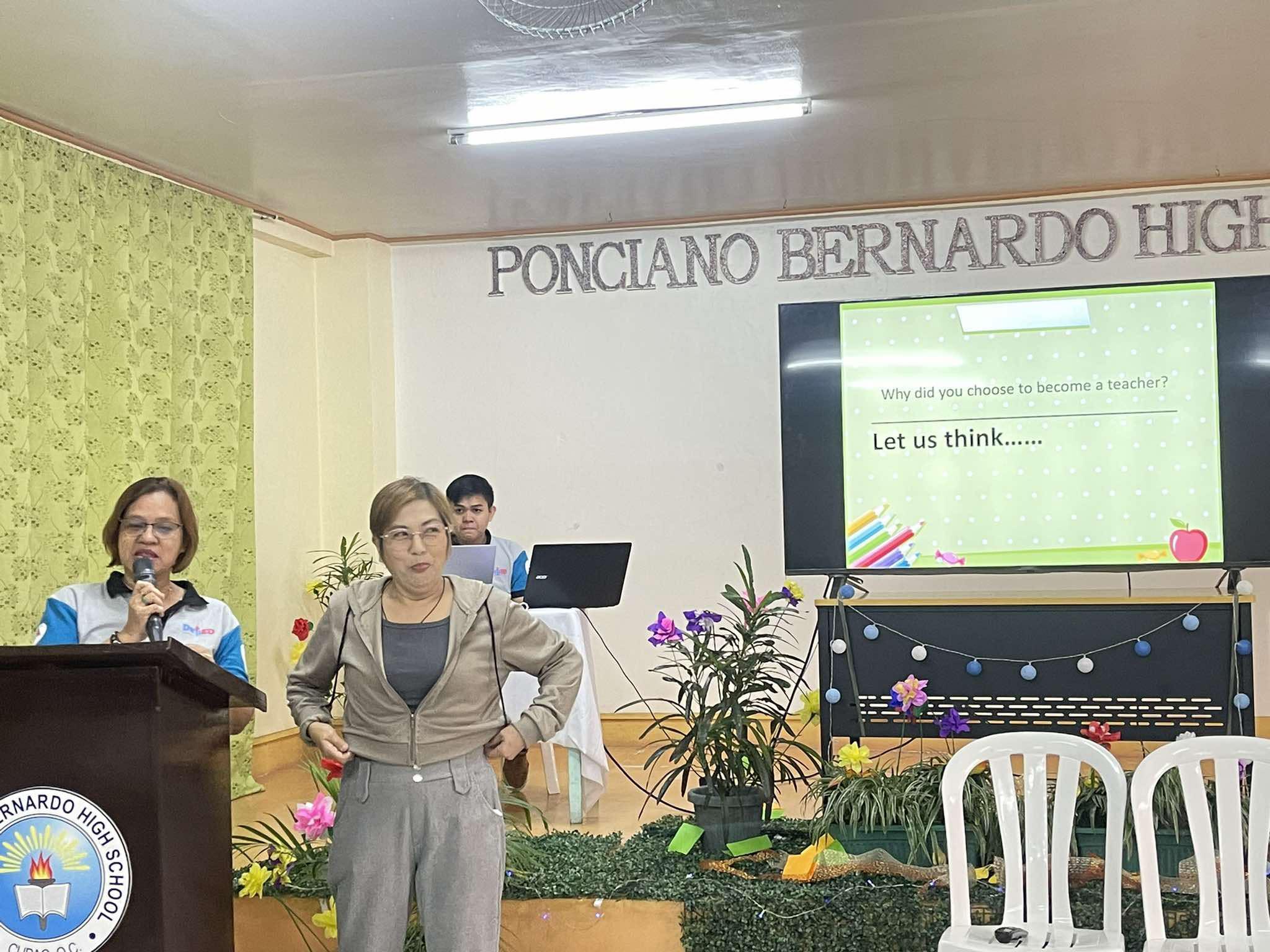
Leinee Allena Nery and Mary Magdalene Mendoza
Asdebates continue about the role of chatbots in education, an increasing number of learners are seeking assistance from ChatGPT for their academic tasks.
The Hillside Chronicle conducted an online poll among learners at Ponciano Bernardo High School to investigate how they use ChatGPT for academic tasks.
The percentage of PBHS learners reporting they utilize ChatGPT for their academic tasks has increased to 43%, according to the survey findings, up from 40% in 2023.
About 225 learners from various grade levels, making up 25% (900) of the total school population, took part in a survey held from January 27 to 28.
When the learners were asked when it is acceptable to use ChatGPT, learners
are far more likely to say it is acceptable to use ChatGPT for research than for essays and math problems.
Just under a third of learners indicate that using ChatGPT for researching new topics is acceptable, with 30% (68). Over half of learners believe it is unacceptable to use it for this purpose, with 54% (122), while less than a fifth of learners, with 16% (35) are unsure about using ChatGPT for research new topics.
Significantly fewer learners support using ChatGPT for math or essay writing. Among these, 15% of learners (34) believe it is acceptable to use ChatGPT
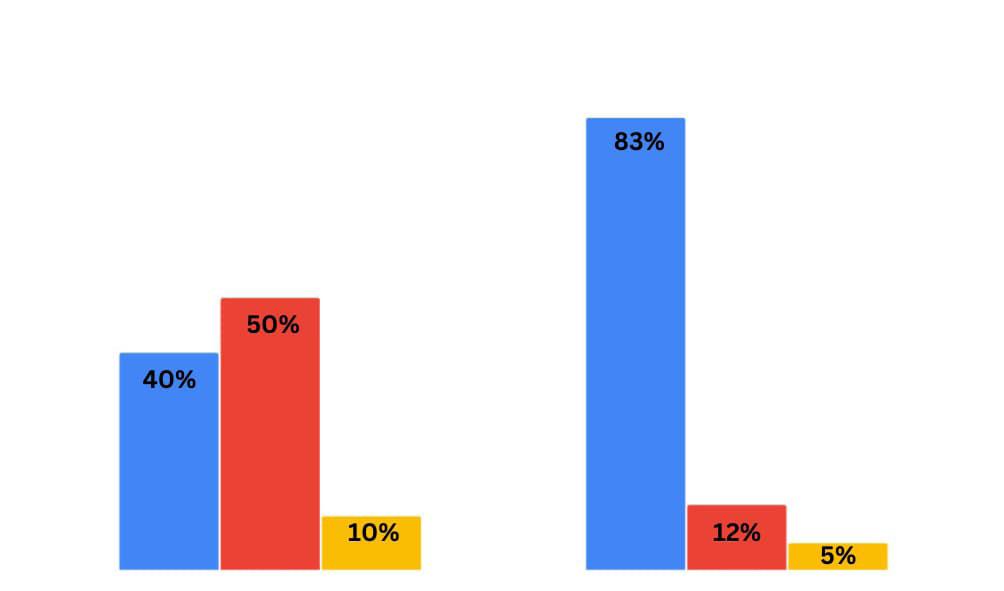
for solving math problems, whereas 35% (39) think it is not acceptable. 75% of learners (169) believe it is permissible to use ChatGPT for essay writing, while 15% (34%) percent disagree. An additional
50% (113) and 10% (20) of learners are unsure about the appropriateness of using ChatGPT for solving math problems and writing essays, respectively.
Furthermore, when asked if learners have heard of ChatGPT from 2023, learners’ awareness of ChatGPT has grown. Overall, 75% of learners say they have heard of this chatbot, up from 35% in 2023.
R esponding to the call from the Department of Education for private sectors to share resources and help improve the state of public schools, TTEC Quezon City Workforce Management Senior Specialist Khen Kadusale recently visited Ponciano Bernardo High School to donate eight units of Smart LED televisions to address the need for digitalized learning in every classroom across the school.
A ceremony for the signing of the deed of donation and turnover of TV sets took place at the PBHS covered court, with the school
Samira Nicole Carillo
principal Edgardo Cruz, represented by Flor Abel Vilog, Master Teacher of the school, and TTEC Woorkforce Management Senior Specialist Khen Kadusale on October 4.
This is the first batch of donations from TTEC Quezon City aimed at supporting the school’s initiative to implement digital learning through the provision of Smart TVs for each classroom in the school.
Based on the records from the school property custodian, of the 20 classrooms, nine do not have a smart TV.
With this, Kadusale assured to help acquire additional Smart LED TVs for
PBHS, since digital teaching equipment will result in a better learning experience for the young learners, Kadusale mentioned during the turnover.
“Ponciano Bernardo High School has evolved into the ideal learning environment for digitalization as it adopts a model for the young learners to develop into professionals,” he remarked.
Kadusale also encouraged the teachers at PBHS to upgrade their professional competencies, enabling learners to progress and adjust to the evolving trend in digital education.

In his message to the donors, Vilog said that they accept TTEC’s challenge and guaranteed that this will help improve the teaching-learning experience throughout the school.
Vilog also said that PBHS is grateful for this partnership and collaboration with TTEC and he hopes that these TV sets will meet the demand for digitalizing the learning experience at the school.
Some 200 Grade 10 learners at Ponciano Bernardo High School received free school supplies, uniforms, and shoes from Congressman Marvin Rillo, the representative for the 4th district of Quezon City. The turnover ceremony was held at the PBHS covered court
on September 27, graced by Raquel Malangen, a councilor from the 4th district of Quezon City, who stood in for Rillo. Malangen reaffirmed their steadfast dedication to assisting PBHS learners, highlighting that they consistently offer free school supplies and uniforms annually.
A Christmas lantern crafted by the officers of the Technology and Livelihood Education (TLE) club at Ponciano Bernardo High School glowed the brightest and won accolades in the division-level parol-making contest on November 4. T he PBHS entry
secured first place among 18 public secondary schools from Quezon City that took part in the competition, allowing PBHS to represent the division in the national parol-making contest with the theme “Harmonies of Hope: Illuminating Filipino Resilience.”

Following the publication of the Program for International Student Assessment, or PISA, which showed our poor ranking in reading, numeracy, and scientific literacy skills, it became clear that the Philippine educational system faced considerable challenges. This is one of the reasons that the current education system in the country requires enhancement or modification.
We also learned about DepEd Order No. 010, s. 2024, a new curriculum called the MATATAG was introduced designed to address the ongoing issues within the country’s education system.
Vice President Sara DuterteCarpio, who previously served as the secretary of the Department of Education, asserts that DepEd’s objective is to improve the Philippine curriculum and will serve as a tool to identify the true needs of Filipino learners.
Even though its aim is to sincerely address and improve the flaws in the education system, such as easing the workload for both learners and teachers, its implementation is leading to another problem that further harms and disrupts our established curriculum. It is clear that even now, many gaps persist in the K-12 curriculum. The Philippines is ill-equipped for the rapid curriculum changes, leading the MATATAG curriculum to cause more confusion than positive effects.
The budget allocated for the education sector in 2024 is around 700 billion pesos. A significant increase is apparent compared to the 2023 budget, which was approximately 600 billion pesos. It is claimed that the rise in the budget is due to the introduction of the MATATAG curriculum in the academic year 2024-2025. Why should DepEd not focus on tackling the inequalities seen in public schools as a priority?
According to DepEd, there was a shortage of 160,000 classrooms in the previous
academic year, a significant figure given the substantial budget needed. We are falling behind not just in classrooms but also in the essential resources needed for a school. How can our education system achieve stability and successfully compete with other countries if those in authority are genuinely ignorant and fail to recognize the problems that need resolution?
While the MATATAG curriculum may seem appealing initially, its implementation is not welldefined. It is evident that this was hurried as numerous teachers and learners were taken by surprise and are currently finding it difficult to manage a week, despite the fact that there is no assurance the exhausted learners have mastered the learning competencies.
The Alliance of Concerned Teachers (ACT) party-list is voicing its opposition and aims to halt its implementation, contending that the challenges and responsibilities of teachers are excessively taxing for inadequate compensation. Is it right to demand something that is already resisted by those impacted by it? The method of implementation is inadequate, leading to ineffective efforts in developing the MATATAG curriculum and wasting resources. Rather than promoting learning and productivity, the new curriculum appears to focus on exhausting and overburdening both teachers and learners.
Alongside the lack of classrooms, equipment, and learning resources, the data released by the DepEd is also quite alarming. Data indicates that there were 89,000 vacant teaching positions in the previous academic year.
The MATATAG curriculum has played a role in the challenges, leading teachers to teach various learning areas. Teachers are teaching in
“...both teachers and learners at PBHS reported facing difficulties and feeling overburdened by the new curriculum, stating that the benefits of MATATAG are not apparent, as its implementation appears dubious and destructive.
subjects they have not studied for many years. Comparable to the circumstances faced by teachers at PBHS they must teach mathematics following the National Mathematics Program (NMP), which aligns with the new curriculum.
Based on the information provided, it is discouraging that our government is ready to risk the quality of education by implementing measures
they believe benefit learners and teachers, while the real outcome is quite the contrary.
Being “strong” does not involve compelling teachers to teach learning areas they are not skilled in. It feels different when they teach learners in their field of specialization. It has just been over a month since classes started, yet learners and teachers are already voicing their complaints. According to a recent online poll conducted by The Hillside Chronicle, approximately 48% of learners at PBHS surveyed about the new instructional time provisions under the MATATAG curriculum reported they are facing increased challenges in adapting to the significant changes in instructional time. The daily allocation of 45 minutes for each learning area is insufficient, leading to difficulties in covering the most essential learning competencies within such a short timeframe. Occasionally, a learning area is addressed twice during one day. They are also weighed down by responsibilities that greatly affect their ability to learn efficiently. Moreover, based on the responses gathered in an interview with The Hillside Chronicle, both teachers and learners at PBHS reported facing difficulties and feeling overburdened by the new curriculum, stating that the benefits of MATATAG are not apparent, as its implementation appears dubious and destructive. The issue regarding the Philippines’ low educational ranking compared to other
countries is not the learners; rather, it is the poor quality of the education system in the country. Those in authority recognize the issues confronting learners, yet it appears the measures being taken are misguided. Rather than addressing the persistent issues within the education sector, they are simply introducing new problems that those in leadership will not face, but which will impact teachers and learners.
Is the new curriculum truly strengthening us? Or are we simply becoming stronger due to the challenges and hardships faced by teachers and learners? Only the voices of those undergoing the new curriculum can provide answers, and these perspectives should be acknowledged by individuals in the education sector.
Do not hold the young learners responsible, as they are merely victims of a twisted system. Any data that arises concerning learners’ performance should be attributed to the officials who plan, design, and dictate the actions within the Philippine education system. Challenge and scrutinize those in authority who ought to be serving the country. Do not enforce the curriculum that teachers and learners dismiss. Find a better solution to the problem that has long been disrupting our system. Rectify the twisted practices instead of enforcing changes that will worsen the already flawed education system in the country.
“In this generation, our attention span is shorter. With shorter classes, you can concentrate better on your specific task.”
– Grade 9
“There is additional time to finish learning activities, and you won’t need to worry about multiple classes every day.”
“Additional class time enables teachers to address more questions from learners and provide further clarification.”
– Grade 7
“No matter if we approve or disapprove of class durations, teachers work to adjust and enhance their teaching experience.”
– Grade 10
– Grade 8 Teachers’

Last year, various news stories surfaced newborn babies found abandoned next to garbage bins, poultry houses, and public restroom facilities. There were babies with their umbilical cords still attached, obviously newly born. One was found by the house entrance. This data pertains to teenage pregnancy. A few individuals
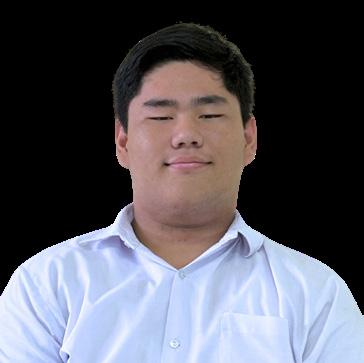
The growing number of teachers voicing their worries about learners of today becoming more unruly, disrespectful, and, if I may add, lacking in basic etiquette cannot be ignored. The longstanding values of respect and discipline seem to have deteriorated, supplanted by a bold confrontation of authority. We can choose to ignore these worries as grievances of an older generation holding onto the past, or we can conduct a comprehensive and honest evaluation of why circumstances have worsened and identify the critical steps to address it.
First of all, we should steer clear of excessively glorifying the past. The youth have never fully been exemplary children even during those supposed golden eras of strict discipline. However, it is indisputable that a significant change has taken place. In the past, the simple

get pregnant during their teenage years. To address the issue, pregnancies are being aborted. Others face risks due to abortion.
This news relates to the controversial issue of sexuality education, which is being advocated for inclusion into the Philippine curriculum. President Ferdinand Marcos Jr. is in favor of integrating sexuality education into school curricula. The President mentioned that there are many cases of teenage pregnancy, and it is appropriate to teach about it in schools.
Ayyellah Freya E. Salvosa
Furthermore, President Marcos has highlighted the significance of Comprehensive Sexuality Education (CSE) in encouraging informed choices and creating a safe and secure environment for young people. His viewpoints often highlight how CSE can empower young individuals with constructive views on sexuality, reduce the incidence of unplanned pregnancies and sexually transmitted infections (STIs), such as HIV, which can threaten the well-being of the mother, the child,
or both, while reinforcing poverty across generations, and encourage respect for diversity and consent, leading to healthier communities.
As a receptive learner knowledgeable in sex education, I occasionally find it humorous, yet it remains an essential part of learners’ educational experience, providing broad insights that empowers us with the knowledge and skills required to make informed decisions about our bodies, health, and relationships.
In simple terms, a comprehensive sex education
is essential for the healthy growth of everyone. This is a matter of health equity: Who has the ability to understand, and thus manage and care for, their own body? How can young people be expected to support themselves and take care of their health without understanding how it truly works?
presence of a teacher in the classroom earned respect, today that same teacher faces a challenging battle against a four-walled room occupied by young dictators wielding smartphones, disrespectful comments, and an exaggerated sense of dominance. Previously, parents and teachers appeared to collaborate in a shared mission of developing responsible citizens. At present, a single phone call from a distressed parent can completely jeopardize a teacher’s authority. It is a detrimental blend of entitlement and misguided priorities, and the young learners have perfected the skill to take advantage of it with remarkable accuracy. Undoubtedly, technology plays a significant role in this story. The digital space, where each individual takes the stage and likes, shares, and comments assess your value, has changed the concept of childhood. Values like humility, patience, and selfdiscipline are overshadowed by the relentless noise of immediate satisfaction.
Screen addiction, alongside parents who are also glued
to their devices, has led to a generation devoid of significant interpersonal relationships. The harsh irony is that while we have become more interconnected, we have simultaneously become more detached from what genuinely counts, such as kindness and decency.
However, there is still the issue of who or what is nurturing these schoolchildren. Numerous parents, weighed down by financial pressures and lured by modern distractions, have unintentionally surrendered their responsibilities to technology and media. Ultimately, technological devices do not promote accountability or respect. Media companies do not care if a child learns to say “please” or “thank you.” Instead, they create various content that frequently celebrates uprising, mockery, and vanity. When learners consume this daily, it affects their perceptions of the world. All of a sudden, the authorities become the targets of jokes and humor.
Furthermore, we accept a societal structure that prioritizes boldness over traditional virtues. Observe
the behavior of certain adults in public places, on social media platforms, or while in authoritative roles. Disrespect has turned into a norm and arrogance is celebrated. Why would schoolchildren hesitate to shout at a teacher when they see adults insulting each other online or expressing anger in public? They merely mirror the world in which they are raised, a world quickly losing its sense of accountability and moral guidance.
Certainly, schools are not without fault. Many institutions have become so focused on test scores and rankings that character development is overlooked. Curricula addressing ethics, values, and appropriate behavior are often viewed as mere distractions, contrary to the essential lessons they should represent. Without a solid foundation in values education, classrooms will become arenas for conflict rather than safe spaces for learning.
Now concerning the clear absence of boundaries in numerous households. Discipline has turned into a negative concept associated with brutality or regressive
Certainly, young people have the right to sexual education. Therefore, teaching sex education in schools is completely appropriate. The youth must learn ways to avoid early pregnancy and should strive not to join the ranks of teenage mothers. attitudes. Nonetheless, that is not the case. Discipline requires demonstrating to children that their actions lead to consequences. Without this direction, the children develop the notion that the world is indebted to them – a mindset they bring into their interactions with teachers, classmates, and even strangers. The response is not a universal solution. Nonetheless, it starts with purposeful and modest actions: parents embracing their role as the child’s first teachers, schools prioritizing character development alongside academic learning outcomes, and communities recognizing that nurturing a child is a shared responsibility rather than an individual obligation. It is essential to communicate clearly what one expects from the child. In the end, the youth pay greater attention to what a person does rather than what they say. To nurture them, it is important to first improve oneself. This poses a challenge for everyone, not just for the schoolchildren. Indeed, the old African proverb, “It takes a village to raise a child,” remains relevant.

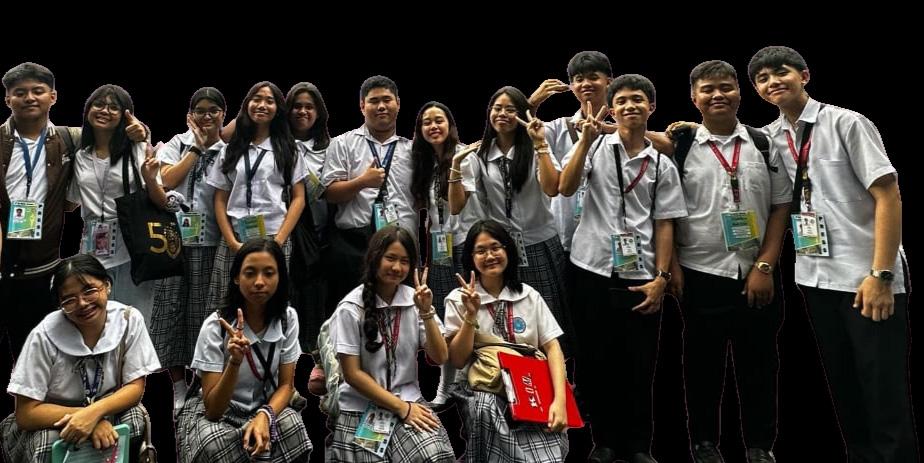

From securing a historic Olympic triumph to engaging political assassins and dealing with budget disputes for 2025, 2024 exposed the struggles facing the Filipino spirit, reflecting the core of journalism and emphasizing the urgent need for reform in our government - will 2025 deliver the transformation we urgently seek?
For a journalist, it is a huge challenge to manage the intricacies of maintaining the torch of press freedom. Many centuries have gone by, but still today, the fabric that suppresses the voices of truth remains. As the modern world advances, an imbalance in the scale of justice is coming to light. While some have succeeded in eliminating

The school emphasized the importance of following the DepEd policy on “No Homework Weekend.” The reminder was given at the first academic quarter
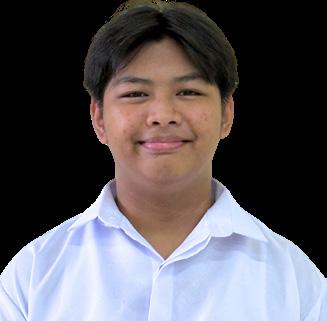
The Philippines has historically faced the violent onslaught of typhoons, but a much more chaotic danger is surfacing recently - political turmoil arising from the clashing personal agendas of the leaders to whom we have entrusted our country’s future. This highlights the presence of corrupt politicians in our nation’s bureaucracy, where their main goal is not to help the people, but to take advantage of their goodwill, turning public service into a profitdriven venture.
The echoes of numerous crises thunder and resound throughout the county’s political arena, overwhelming
the red mark, it is clear that numerous others continue to hold onto its sticky quality.
Among the notable redtaggers in the Philippines are Lorraine Badoy and Jeffrey Celiz, both linked to Sonshine Media Network International (SMNI). It should be remembered that Badoy, the former spokesperson for the National Task Force to End Local Communist Armed Conflict (NTF-ELCAC), along with the rebel communist Celiz, have been naming different individuals and organizations for a long time. During her tenure in Rodrigo Duterte’s administration, Badoy labeled the news media outlet Rappler as red-tagged. Meanwhile, since 2022, Badoy and Celiz have continued to red-tag GMA news anchor Atom Araullo and his mother through the program “Laban Kasama ng Bayan.” The two Araullo and his mother mother of
homeroom parent-teacher conference that took place on August 18. This suggests that learners should not receive homework over the weekend from their classes that is due on the day they return.
The school reiterated that the policy aims to enable learners to enjoy more quality time with their parents, family, and friends by limiting homework to a reasonable amount during school days
Filipino citizens and obscuring important issues that extend beyond the intrigues and rivalries occurring within government halls and spread over its various divisions.
The midterm elections in the Philippines for 2025 are just three months away from the election date on May 12. Since the submission of Certificate of Candidacy in October last year, numerous candidates have embarked on their electoral journeys, including showbiz personality Marco Gumabao, vlogger Rosmar Tan, and Diwata, political Tiktoker Eli San Fernando, all emerging to seek positions in Congress.
This does not imply that a celebrity or content creator cannot become an excellent politician. The argument presented in this matter is that they lack experience in politics, meaning they are not just passive observers while creating political content. Putting no effort
Ma.Ysabelle Kim
being members of the rebel group Communist Party of the Philippines (CPP), New People’s Army (NPA), and National Democratic Front (NDF). These accusations were not only aired on television but also on the social media page of SMNI. The blatant red-tagging by the two, despite the lack of clear evidence, tarnished the reputations of the Araullo family, resulting in the court imposing over two million pesos in damages on them.
In a rare win for civil rights, the Supreme Court ruled on May 8 that “redtagging” poses a risk to people’s safety, freedom, and life. This ruling is a significant step in combating the government’s long-standing practice of labeling individuals and groups as communist supporters in order to justify harassment and intimidation.
The ruling acknowledges the pain endured by many
student leaders, activists, journalists, and critics who have persistently suffered from harassment and threats that are masked as antiinsurgency measures. It serves as a vital safeguard against governmental authority and highlights that security issues do not warrant the violation of human rights. As stated in the decision, “Red-tagging, defamation, labeling, and guilt by association endanger an individual’s right to life, liberty, or safety, potentially warranting the granting of a writ of amparo.”
Atom Araullo’s win over Badoy and Celiz represents an important victory for all journalists targeted, abused, and murdered by the influential, avaricious people who dread the unmasking of the corruption concealed behind their influence. Although this is a significant step towards ending redtagging, the bitter truth is that
and removing it altogether on weekends.
Nevertheless, despite this situation, the policy is not being implemented, and numerous learners continue to receive homework during weekends.
One advantage for learners if teachers adhered to the
policy would be that it would enable them to unwind, enjoy time with family and friends, and review subjects they studied in class. Primarily, a significant advantage they would achieve is obtaining additional rest.
Sleep is the top priority for learners to remain motivated
Craig David Santiago
into learning about politics and public administration, lacking concrete platforms, only having aspirations and intentions.
If Filipinos can maintain exceptionally high expectations for beauty queens or artists, it is only fair to apply the same level of effort is devoted to critical thinking in voters. Filipinos should not anticipate effective public service if they do not possess the ability to vote for political candidates who have the appropriate qualifications, reflecting the traits of both politicians and true public servants.
If Filipinos continue to elect politicians with records of corruption and irregularities within government positions, they should anticipate a repeated betrayal of their public trust
resulting in poor outcomes. The current national shame that the Uniteam represents is a major outcome of this Filipino cycle. For the Filipinos, the unity of President Ferdinand Marcos Jr. and Vice President Sara Duterte has now undergone a remarkable shift. A twist in the story that frankly was easy to foresee. All Filipinos are entitled to seek public office provided they fulfill the qualifications outlined in the Philippine Constitution and other legal regulations. It is crucial, however, to modify the standards set for those aspiring to higher positions, as existing qualifications for public office produce only the most minimal outcomes, allowing unqualified individuals to ascend to power with ease. Therefore, to enhance the system, it is crucial to establish elevated
not everyone is like Atom, who has the privilege to pay for a lawyer and defend himself in court. Many journalists chose to retreat, remain silent, and live in fear rather than face the giants that could still threaten their lives. Clearly, the hue of journalism is red. Promoting and revealing the true nature of reality to the public has become challenging due to persistent obstacles, and these issues will not be resolved if they are ignored.
As a campus writer, I believe that no form of oppression can silence our voices, distort our writings, or lessen our deep commitment to being responsible journalists. Let us strive to break down the culture of impunity that has allowed redtagging to flourish. In this way, journalism will shine again, not in the red of peril, but in the white of truth and liberty.
and succeed academically, allowing them to recover the rest they lost during the week. It will also assist them in thinking clearly and enhancing their physical and mental well-being.
In conclusion, even though the “No Homework” policy is not adhered to effectively, it ought to be implemented to ensure that learners have a more relaxed, balanced, and crucially, less stressful life.
educational qualifications, policy expertise, literacy, and public service experience, all aimed at achieving the seemingly highest ethical standards expected of them. If these criteria are not fulfilled for national roles, then individuals attempting to enter governance should be legally prevented from seeking office. Although suffrage and participation are constitutional rights in the Philippines, for Filipino voters, ignoring electoral accountability cannot excuse the betrayal when it occurs; a demand to remove an inadequate government must lead us to confront the errors of one and collectively endure the consequences. Storms will never be tolerated. It is essential to advocate for leadership that rebuilds rather than tears down, that truly unites rather than divides, prioritizing people over profit.
Dear Editor,
Good day!
I wish to express my appreciation to our recently designated school principal, Sir Ed. I believe our school is now cleaner than it was under his leadership. I have seen how he motivates the learners and teachers to maintain the cleanliness of the school environment by promising to inspect each classroom to ensure it is safe, secure, and conducive for learning. Additionally, I observed that at present there is not a lot of trash in the school, and that learners regularly tidy up the four-walled classrooms. It is comforting to note that the school environment is improving, and his dedication is undoubtedly producing outcomes concerning the physical condition of the school.
Dear Benedict,
Greetings!
The school has undoubtedly experienced significant improvement since Sir Ed assumed leadership. However, it has only been a few months since he took on the role of our new principal, and it remains too soon to claim that the overall atmosphere of the school in all areas has improved. The coming years will be exciting to observe and learn under Sir Ed’s leadership.

In a neighborhood in Cubao Quezon City, in a street so quiet, memories, dreams, and countless laughter exist. In the 56 years that Ponciano Bernardo High School has existed, it has produced countless champions. Athletes, influencers, and successful businessmen and women are only the tip of the iceberg if you look into the deep ocean of champions forged in this school
Just like in sports, forging a champion is difficult. It has to stand against the test of time, injuries, and countless sweat, blood, and tears needed to be shed to win.
Champions are hard to forge. Do you realize what else is difficult? Creating life champions. Throughout its 56 years, PBHS has endured the
test of time, with each graduate acquiring lessons that will remain with them for a lifetime.
The epitome of a life champion shaped by PBHS is Dr. Ralph Delas Alas.
An alumnus of PBHS, recognized as one of the top ten student nurses of 2008, a physician, dentist, entrepreneur, and cofounder of Urban Smiles Dental Clinic.
To establish a distinct and recognizable identity over time, Dr. Delas Alas has branded himself with the initials Dr. RFD. The title he established for himself has turned into a well-known name, bringing with it the fame and influence to share more of his knowledge and expertise with the dental industry. Becoming a dentist was
not included in the plans for the celebrity dentist and head of Urban Smiles Dental Clinic, Dr. RFD. Recognized as a smile creator, Dr. RFD has not always envisioned bringing smiles to others. He initially aspired to become a physician in the United States of America, but when motivation hits, the heart leads the way. Prior to pursuing a career
in dentistry, Dr. RFD earned a Bachelor of Science in Biology at the University of the Philippines Baguio, as he aimed to become a medical professional overseas, which provided a solid educational and medical foundation.
To enhance and reinforce his pre-medical studies, Dr. RFD ultimately pursued a Bachelor of Science in Nursing at St. Luke’s Medical
Center affiliated with St. Joseph’s College of Quezon City. Being a diligent student who devoted the majority of his time to his room, he successfully passed the nursing licensure exam. With a refreshed and more determined spirit, he completed his master’s degree in Nursing at La Salette over a span of four years.
hroughout his studies over the years, Dr. RFD has only three key pieces of advice that correspond to the letters in his name: R for resilience, F for fortitude, and D for discipline.
R represents resilience when someone wrongs him, and Dr. RFD must act
DFRand
has become, and with D as dedication, he is capable of achieving numerous goals.
N o one is destined to fail as long as they give their all and go beyond their boundaries. Dr. RFD embodies the essence of a life champion. A man who achieved his dreams through diligence and commitment. Achievement is not the end goal; instead, fulfillment is. No one is fated to fail if they possess the qualities needed to succeed, the thirst for knowledge and love for their pursuits. History
isn’t inscribed on one’s hand; instead, it is crafted through perseverance and effort. Bernardians are not shaped to be losers; they are shaped to be winners. Although some might claim that concerns remain unaddressed, no alumni can contest that, despite the hurdles, PBHS has prepared them to succeed in life. Anyone can experience failure, but only a select few can overcome it and
achieve victory. Bernardians is specifically designed for that purpose. Success can only be attained through dedicated effort and enthusiasm. Passion is attained through dedication and effort. It can be stated that PBHS is a small school, yet a small school brimming with memories, excellence, passion, and determination is as significant as the largest schools.

Four years after the pandemic, when the education system in the country is facing questions and challenges, the light of hope among Filipino youths continues to shine. Amidst the challenges and controversies, the hope for a better future remains.
Years of hardship have been spent improving the education system in the country—and just when it was promised to be improved, new controversies surfaced. But despite all of these, a light in the dark sparked and brought along a new hope and a ray of sunlight in a world covered by darkness.
Consider the metaphor of light as a vital force in education, illuminating minds and breaking the chains of ignorance. What if we examined the role of mentorship and community support as guiding lights for students navigating the complexities of learning? Explore how grassroots movements and grassroots initiatives have emerged as powerful sources of inspiration, fostering resilience and hope in the face of adversity.
Imagine a world where the flicker of a candle represents the spark of knowledge, illuminating the path for those seeking education in the shadows of ignorance. What if we explored how innovative teaching methods and technology act as beacons of light, guiding students through the darkness of educational disparities?

In a country like the Philippines where it is currently meeting an educational crisis that is severely alarming, especially in the youth, countless citizens are worried of their fate—the youth’s education is the one thing that will dictate the fate of the country.
Education in times like these, where the country is simultaneously experiencing political and economic issues, is a
In an era of fast-paced technology, a book serves as a sanctuary where a hidden gem can be found amidst the sea of distractions caused by the chaos of screens. A simple act of holding a book becomes a quiet escape against the rush of life. It’s a moment of solitude where our imagination takes lead. Reading becomes an addictive sensation, telling us to slow down and savor, where stories are humanities communal currency of flavor, a lingering rhythm into a narration that feels like it is untouched by time. A testament of simple enjoyment that can be found in life
This generation is unique; it lives in an exceptional world full of knowledge. As books burned to ashes, advanced technology spread like wildfire, forgetting that our understanding of life began on pages. As my eyes scan across each
critical asset that one must have, for it is the main thing that will enlighten and inform the mass of what is truly happening in their nation, making it a powerful weapon that anyone can use, especially the youth. The lack of education that Filipinos receive is one very serious thing that needs to be taken action of not only by the government but also by the citizens of the country; the youth’s are the ones at stake because it
is very important that their personal traits and qualities as a person are fostered and developed amidst the chaos of the country.
You are able to say that the Philippines as a country is developing in terms of education, although it is turning an unexpected turn—making the people of the country hope for a better administration to handle this crisis.
letter of the sheets I fold, nostalgia floods my mind—a sensation of childhood recollections fills my thoughts. While reading a book I accidently laid my eyes on, projector-like imagery fills the blank space in my thoughts, ranging from stars to old queens and their descendants, tales of gods and goddesses, and the romantic feel of a novel. Part of literature has played a pivotal role in history. Each published book serves as a link between all living things, covering topics such as history, beliefs, food, trends, and much more. Some contain images that will pique your interest and make you envision the events during war, hunting, and the love lives of the hierarchy. Even without going from place to place, reading will teach you about their heritage and culture, which are documented in papers available in most libraries and online.
Breaking barriers, gaining knowledge of all kinds of languages that you can learn by just reading literature to your liking.
This has become an opportunity for us to appreciate the authors who have written books for ages for us young generations to learn. Creating a big impact in our lives, serving us with great understanding and awareness about our own people and others. Topics that we discuss in school, without books, we have to restart our research.
Delve into the stories of individuals and communities who have transformed their lives through access to education, revealing the profound impact of learning even in the most challenging circumstances.
Envision the concept of light as a symbol of hope and enlightenment in the realm of education, where it pierces through the darkness of inequality and lack of resources. What if we investigated the transformative power of education in underprivileged areas, highlighting the innovative strategies employed by educators and students alike to overcome obstacles?
This exploration could reveal the extraordinary resilience of individuals who, despite facing significant challenges, have illuminated their paths through learning, creating a ripple effect that brightens their entire communities.
Recent rankings and examinations marked a point in the education system where changes and adjustments seem to be ineffective. Wherein the state of the country’s education seems to be at its darkest point.
With this in mind, the country’s youth continues to fight for better education and progress in its current state. Voices are being used, platforms allow information to spread, and the fight for change continues.
Today, years have passed, generation Y (Gen Y) has helped shape the society we know today. As we evolved, Generation Z (Gen Z) is preparing to take greater responsibilities, stepping in to collaborate with Gen Y in society.
Generation Z, also known as Gen Z, existed in the 1990’s to early 2010’s. Gen Z is preparing to work their way to handle such
greater responsibilities as they are the next era in society. Gen Y was a great help for Gen Z to nurture them and make the Gen Z we know today. It will have a great impact, hoping for a positive future.
This will have a huge impact once Gen Z becomes the leaders of the nation we lived in, witnessing the new era and a new leadership that will change a lot. A lot of

changes will occur, and it is waiting to shine when the time comes. hopeful for a positive change.
Gen Y had the crucial role in nurturing Gen Z; they are preparing to handle such bigger responsibilities that can affect the nation. They are the next leaders in society; it will be a new era. They will bring hope for a better future.
The Philippine education system at this point is at a crossroads—inadequate practice, rare resources, and inadequate access to opportunities. These are compelling reasons why most arguments today focus on preparing students to face a rapidly changing world. This requires bold reformulations around the themes of inclusivity, innovation, and resilience. Technology is out front for this revolution.
The Department of Education (DepEd) has introduced initiatives like blended learning models and e-classrooms to make education more flexible and engaging. Yet, the digital divide remains a significant challenge. In many rural areas, students lack reliable internet access and devices, while teachers struggle with insufficient training to effectively use technology in classrooms. Bridging that gap requires big infrastructure investments and the equitable
distribution of resources both in the government and private sectors.
Evident in the core of the reform is the Matatag Curriculum, a product of improvements in the K-12 Basic Education Curriculum. It aims to correct the inadequacies through a streamlined content program focusing on foundational skills: literacy, numeracy, and critical thinking, therefore enhancing the outcomes of the students, even in international assessments such as PISA.
The hasty implementation of these reforms has also left most teachers with substantial gaps in their training and without the updated teaching materials and clear guides for implementation. Success in such reforms calls for active cooperation among teachers, parents, and policymakers.
Inclusivity is an urgent topic that needs attention. There exist major inequalities among various groups of marginalized communities— indigenous communities, learners with disabilities,
and those in distant, rural areas—that are systematically prevented from enjoying quality education. Accessible schools have to be constructed, scholarships provided, and community-led programs formulated to meet their differing needs. No learner left behind is crucial to the nation’s advancement.
A better Philippine education is only possible through collaboration. The government must put more focus on funding and evidence-based reform; private enterprises can innovate and provide; communities must advocate and support better implementation. Together, these should create an education system that empowers every learner. Addressing inequalities and embracing change, the Philippines can equip its students not only to succeed in school but also to contribute meaningfully in society and on the global stage.
Andrei Mathew Aquino and Chad Perono
Recognizing the significance of delivering socio-emotional support to learners, Flor Abel Vilog, a Grade 10 English teacher at Ponciano Bernardo High School, has incorporated socio-emotional learning (SEL) into reading lessons to strengthen learners’ resilience, awareness of their mental health needs, and to empower them as champions for socioemotional wellness within and beyond the school.
Vilog informed The Hillside Chronicle that the infusion of SEL into his reading lesson consists of three phases: SEL Ready, SEL Set, and SEL Go.
He further explained that at each phase of the SEL, he would present learners with an “emotional thermometer” and inquire about their current “emotional temperature,” prompting them to articulate their reasons for choosing a
specific emotion before moving from one learning activity to another.
“The emotional thermometer has five distinct zones. It begins with green - the peaceful area - outlining emotions and actions linked to that area. The meter rises to the red area - the intense zone accompanied by advice to assist the learner right away,” he said.
Additionally, he mentioned that besides

inquiring about learning emotional state, he would provide “breathing exercises, as they can positively impact the body and help in changing moods.
Vilog also emphasized that integrating socialemotional learning and reading creates a rich and meaningful learning experience for Grade 10 learners.
He said, “The emotional temperature
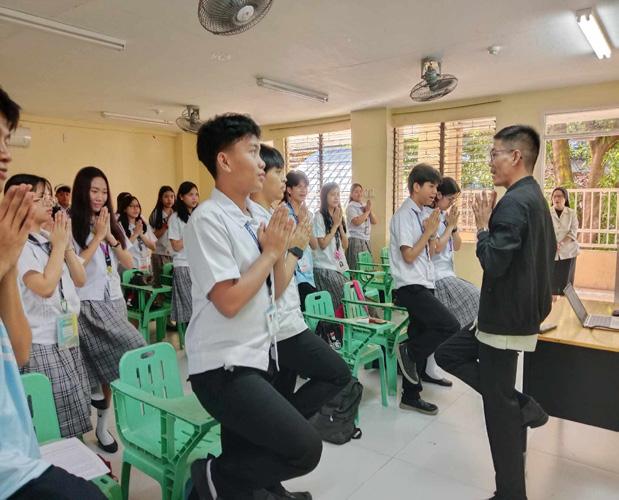
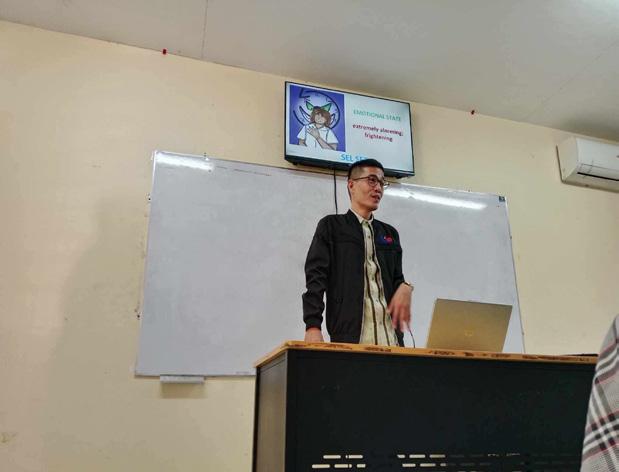
Science behind the link between reading and SEL 11 percentile point improvements in academic performance compared to those who did not take part in SEL programs. Furthermore, enhancing social and emotional skills can result in improved cognitive capabilities, essential for achieving reading success.
Research and evidence support the connection between social emotional learning and reading success. Although there are legitimate discussions regarding methods of teaching reading, there is an increasing recognition that learners’ social and emotional skills significantly influence their capacity to read
Iat their full potential.
Studies have shown that learners involved in SEL activities often display improved reading academic performance. A research conducted by the Collaborative for Academic, Social, and Emotional Learning (CASEL) revealed that learners involved in SEL programs experienced
To facilitate an engaging SEL activity in his reading class, Vilog shared with The
serves as an excellent visual aid to help learners in gaining greater emotional awareness. As teachers, our goal is to prepare learners with the abilities to understand and manage their emotional landscapes. Featuring clear visuals and an organized method, the emotional temperature provides a straightforward and efficient way to achieve that goal.”
“Through the use of
close reading materials focused on SEL themes, I involve my students’ emotions and intellect, nurturing empathy, analytical skills, and emotional awareness. By engaging in meaningful conversations, reflective writing, and authentic practice, I enable students to grow into caring, empathetic people who approach the world with compassion and insight,” he added.
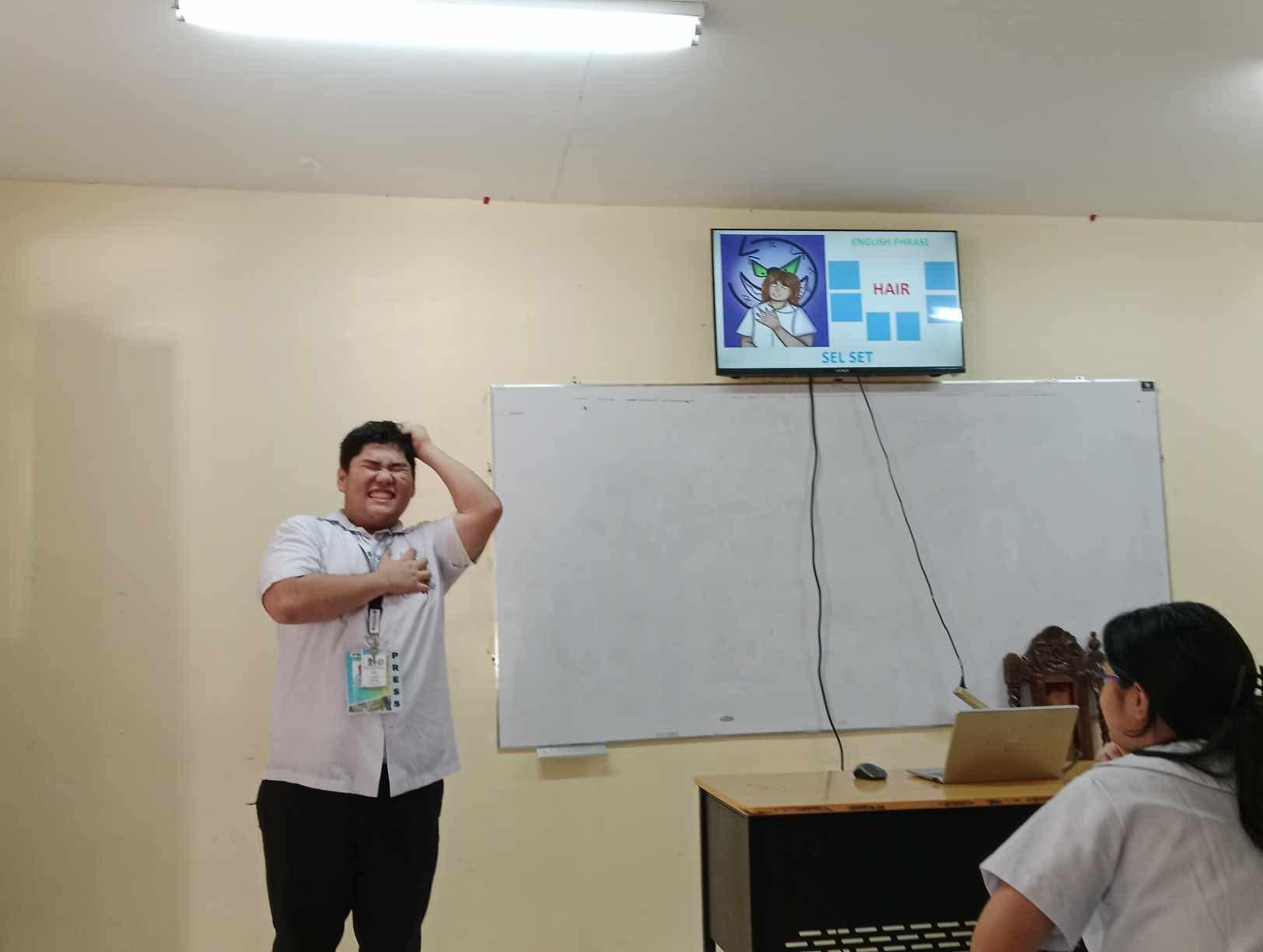
Hillside Chronicle that learners were asked to select an English phrase from the teacher’s table without disclosing their choice to the class, and then had to perform it visually, illustrating the emotional expression, while the other classmates tried to guess the phrase being acted out.
Even though the intervention occurred in a reading class,
Vilog believed that it is possible to incorporate SEL into other learning areas.”
“By engaging directly with learners, teachers can uniquely identify content that emotionally connects with learners, leading to a considerable degree of engagement which will be vital for the development of future interdisciplinary SEL strategies,” he said.
n celebration of the national mental health month, Ponciano Bernardo High School held a seminar on student mental health awareness on October 28.Victor De Castro, the leader of Victor Youth Group Philippines, served as the resource speaker for the event.
He underscored the existence of mental health crises, including but not restricted to disorders and illnesses.
He started by explaining the idea of “buying and not buying” thoughts that the minds might process each day, and the importance of the initial thoughts.
Furthermore, he shared that the brain may interpret and predict events based on our past experiences, therefore influencing our performance for the day’s tasks.
He further explained that we, as people, can consistently challenge our thoughts and separate our body and consciousness from those thoughts, allowing individuals to take charge of their mental wellbeing.
Similar to other health conditions, he highlighted the importance of promptly identifying mental health crises, disabilities, or emotional distress, as this can aid the individual in achieving self-awareness and obtaining the

necessary help or support. He also outlined methods for managing mental health issues. Examples of coping strategies included setting boundaries and advice like reducing expectations, requesting assistance from others, taking accountability for the situation, participating in problem-solving, nurturing supportive relationships, and reinforcing support systems.
Additionally, he provided important perspectives on addressing mental health
stigma. Several methods to combat mental health stigma were discussed, including openly discussing mental health to promote safe environments, educating oneself and others, being mindful of language, and advocating for equality between physical and mental health issues. Finally, the importance of self-care was highlighted as a means to enhance mental well-being and lower the likelihood of health issues
Mary Magdalene Mendoza
Asdebates continue about the role of chatbots in education, an increasing number of learners are seeking assistance from ChatGPT for their academic tasks.
The Hillside Chronicle conducted an online poll among learners at Ponciano Bernardo High School to investigate how they use ChatGPT for academic tasks.
The percentage of PBHS learners reporting they utilize ChatGPT for their academic tasks has increased to 43%, according to the survey findings, up from 40% in 2023.
About 225 learners from various grade levels, making up 25% (900) of the total school population, took part in a survey held from January 27 to 28.
When the learners were asked when it is acceptable to use ChatGPT, learners are far more likely to say it is acceptable to use ChatGPT for research than for essays and math problems.
Just under a third of learners indicate that using ChatGPT for researching new topics is acceptable, with 30% (68). Over half of learners believe it is unacceptable to use it for this purpose, with 54% (122), while less than a fifth of learners, with 16% (35) are unsure about using ChatGPT for research new topics.
Significantly fewer learners support using ChatGPT for math or essay writing. Among these, 15% of learners (34) believe it is acceptable to use ChatGPT
for solving math problems, whereas 35% (39) think it is not acceptable. 75% of learners (169) believe it is permissible to use ChatGPT for essay writing, while 15% (34%) percent disagree. An additional 50% (113) and 10% (20) of learners are unsure about the appropriateness of using ChatGPT for solving math problems and writing essays, respectively. Furthermore, when asked if learners have heard of ChatGPT from 2023, learners’ awareness of ChatGPT has grown. Overall, 75% of learners say they have heard of this chatbot, up from 35% in 2023.
In a separate survey conducted in 2023, The Hillside Chronicle inquired of teachers at Ponciano Bernardo High School whether they feel unsure about or perceive drawbacks to the widespread use of ChatGPT in academic tasks.
A quarter of teachers believe that employing ChatGPT for academic tasks causes more harm than benefits. Around 35% of teachers believe there is roughly an equal balance of advantages and disadvantages, whereas merely 10% of teachers assert it is more beneficial than detrimental. An additional 30% of teachers indicate uncertainty.

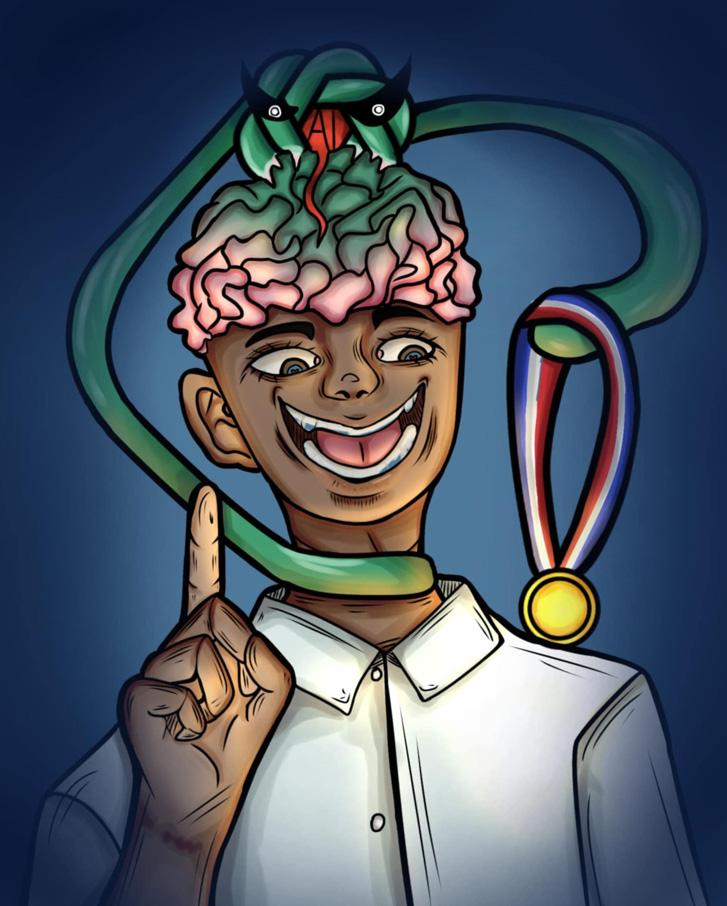

The editorial board of The Hillside Chronicle participated in the Regional Science, Technology, and Innovation Week (RSTW) with the theme “Bridging Science, Technology, and Green Economy Solutions in the Metro” at the Amoranto Sports Complex from October 29 to 31.
The three-day exhibition organized by the Department of Science and Technology (DOST) and DOST’s NuLAB provided an opportunity for learners from various public schools across the National Capital Region
(NCR) to deepen their understanding of science and technology.
Participants in the exhibition had the opportunity to gain additional insights into nuclear power plants globally, recently developed devices for radiation detection in various products, applications of artificial intelligence in creating virtual games, robotics, and much more.
The exhibit also highlighted its biology area with games available to all participants, along with cookies and assorted
snacks made from locally sourced ingredients such as kalabasa and niyog, given to those who succeeded in the games. Another significant feature is the robotics showcase, where teachers and learners participated in games and competitions using robots made by STEM learners from across the country.
DOST’s RSTW will journey across the nation, shifting from region to region to showcase each exhibition and provide extra information to learners throughout the country.

“Buhos Ponching! We came as fighters, we left as champions!”

These words resonate with the victorious chant of the arnis team at Ponciano Bernardo High School after their win at the congressional district 4 arnis tournament.
Achieving mastery in a single sport is challenging on its own, but dominating is an entirely different challenge.
At the Quezon City District 4 Arnis Championship held at Camp Crame Elementary School, the Arnis Team from Ponciano Bernardo High School (PBAT) secured 8 gold
medals and 2 silver medals, finishing the tournament with an 80% ratio of gold medals.
Dominance prevailed everywhere as Rodnel Griño earned the title of gold medalist in Pinweight, John Ayein Carticiano secured gold in Bantamweight, Rain Evasco claimed gold in Lightweight, Anna Thea Punongbayan brought home gold in Pinweight, Janela Jaca won gold in Bantamweight, Rodeliza Marcia emerged as gold
medalist in Featherweight, Ayeisha Anota took home gold in Lightweight, and Sean E. Baniqued concluded the tournament as gold medalist in Lightweight. The siblings Sid Anthony Sinoddong and Andrei Sinoddong also secured two silver medals at the tournament.
Three years postpandemic, as the nation gradually mends from the impacts it caused - PBAT continues to excel. Pride, blood, sweat, and heart are
what they contribute to the game in every tournament they participate in. outstanding performance is what sustains their existence. Creating a winning culture is difficult to achieve. Achieving victory is challenging on its own, but PBAT has made it attainable. Likewise, creating champions is a challenging task, yet PBAT demonstrated that the heat of the forge consistently yields champions.
R ocky League, James Catacutan, Porsche Miranda, and Charmaine Sualibios secured third at the recent congressional district IV chess tournament held at Don Alejandro Roces Sr. Science and Technology High School on October 5.
The Chess Team of Ponciano Bernardo High School (PBHS)— Porsche Miranda and Charmaine R. Sualibios in the girls’ division, and Rocky League and James Catacutan in the boys’ division—secured 3rd place in the district competition held on October 5, 2024, at Don Alejandro Roces Sr. Science-Technology High School.
In the individual
Ponciano Bernardo High School was defeated by Quezon City High School in the District 4 Quezon City Women’s Volleyball Meet on Saturday, October 5, at the QCHS venue: 25-8, 25-12.
Quezon City High School thrives in volleyball, while Ponciano Bernardo High School is still honing its abilities. Throughout the district, the women’s volleyball matches saw PBHS women’s team compete against QCHS women’s team at the Quezon City High School volleyball court. The PBHS team started the service but did not manage to secure the point. Even though QCHS’s squad was definitely skilled, they effortlessly won the first set with a score of 25-8.
The second set commenced, and QCHS
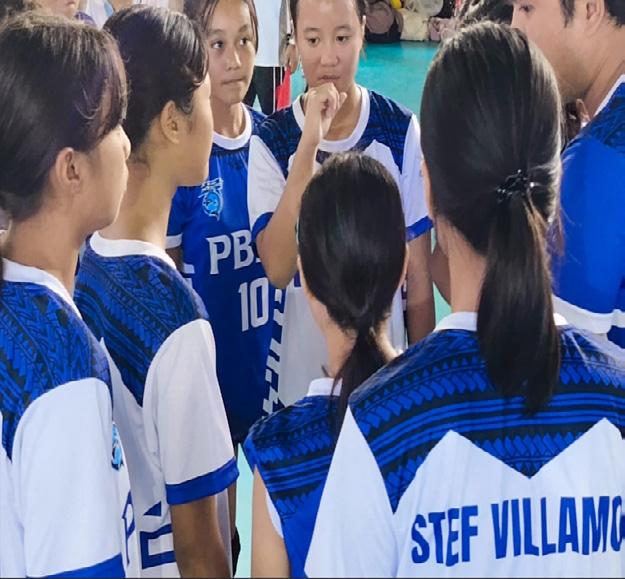
Chad Perono commitment and talent, simultaneously demonstrating the prowess of PBHS’s young intellects in the game of chess.
category, Porsche Miranda claimed 3rd place by triumphed in three bouts against tough competitors, while her teammate Charmaine R. Sualibios also performed well, achieving two wins and making it into the top 10.
In the team category, the girls’ chess team, made up of Miranda and Sualibios, secured 3rd place after demonstrating excellent teamwork and strategies during the event.
Conversely, the boys’ team, represented by League and Catacutan, did not qualify for the top 10, yet they showed considerable improvement in their contest.
The success of the PBHS Chess team showcases their
The competition was conducted in a round-robin format. The time regulation consisted of 45 minutes along with an additional 15 seconds for each player.
began to notice a change in the gameplay of PBHS. They focused on defense, depending on their middle blocker Shane Cristal for scoring, but it proved inadequate against QCHS’s adaptability, resulting in a loss for PBHS by a score of 25-12.
The PBHS varsity chess team was led by coaches Cassandra Villacorte and Ann Rhea Valencia.
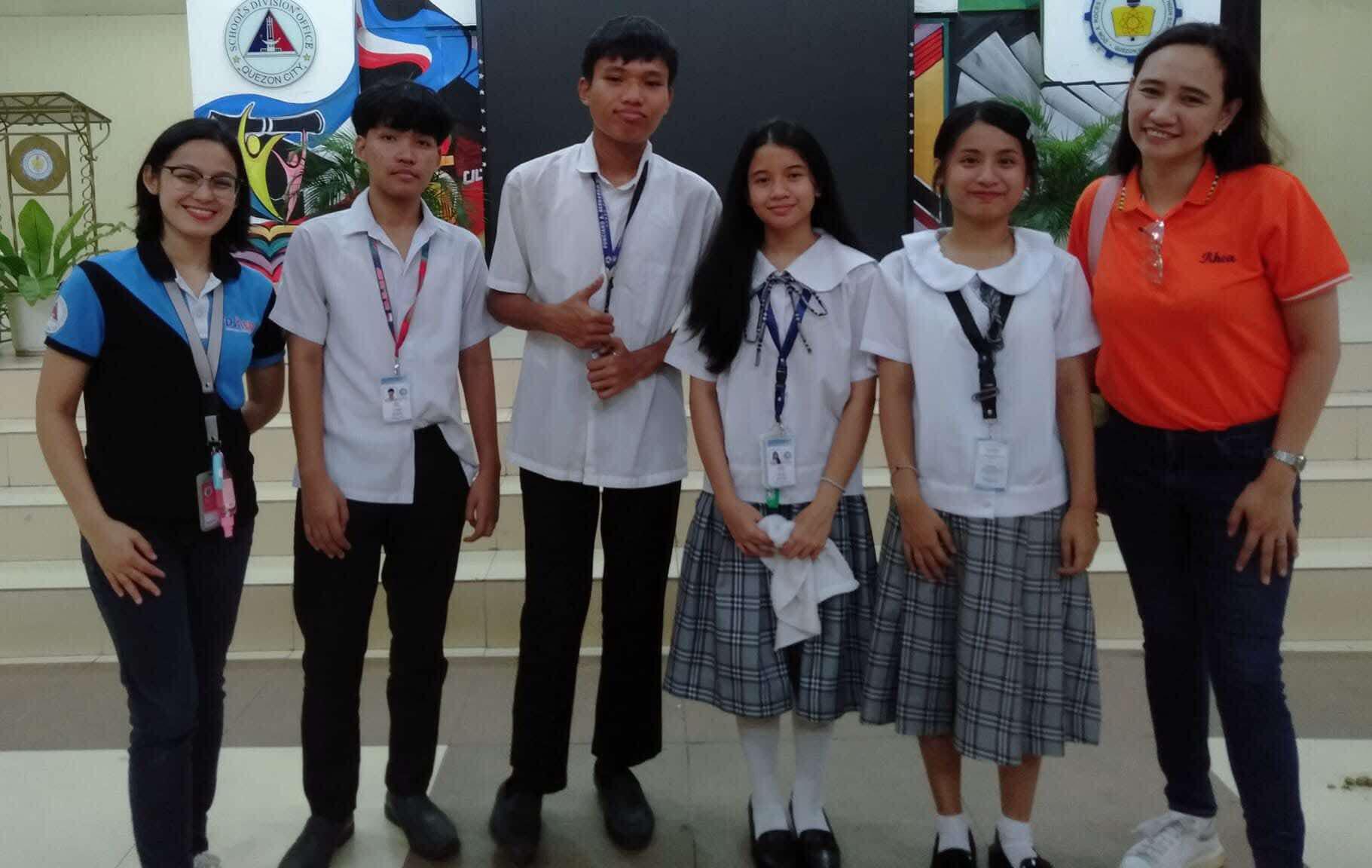
“When we first observed the QCHS women during their warm-ups, I felt somewhat anxious due to the skills they displayed in serving, receiving, and spiking.” Their skills in this sport are truly impressive, but I still have faith in our PBHS Women’s team. “We trained every day, and I believe we can achieve it, but it seems we lose 2 sets to them,” remarked Rojeto Sidon, the coach of PBHS Women’s team.
Rojeto Sidon, the coach of PBHS women, stated, “We’ll train a bit earlier than before, so they can anticipate our participation in the District League again, and we hope to see some improvement.”